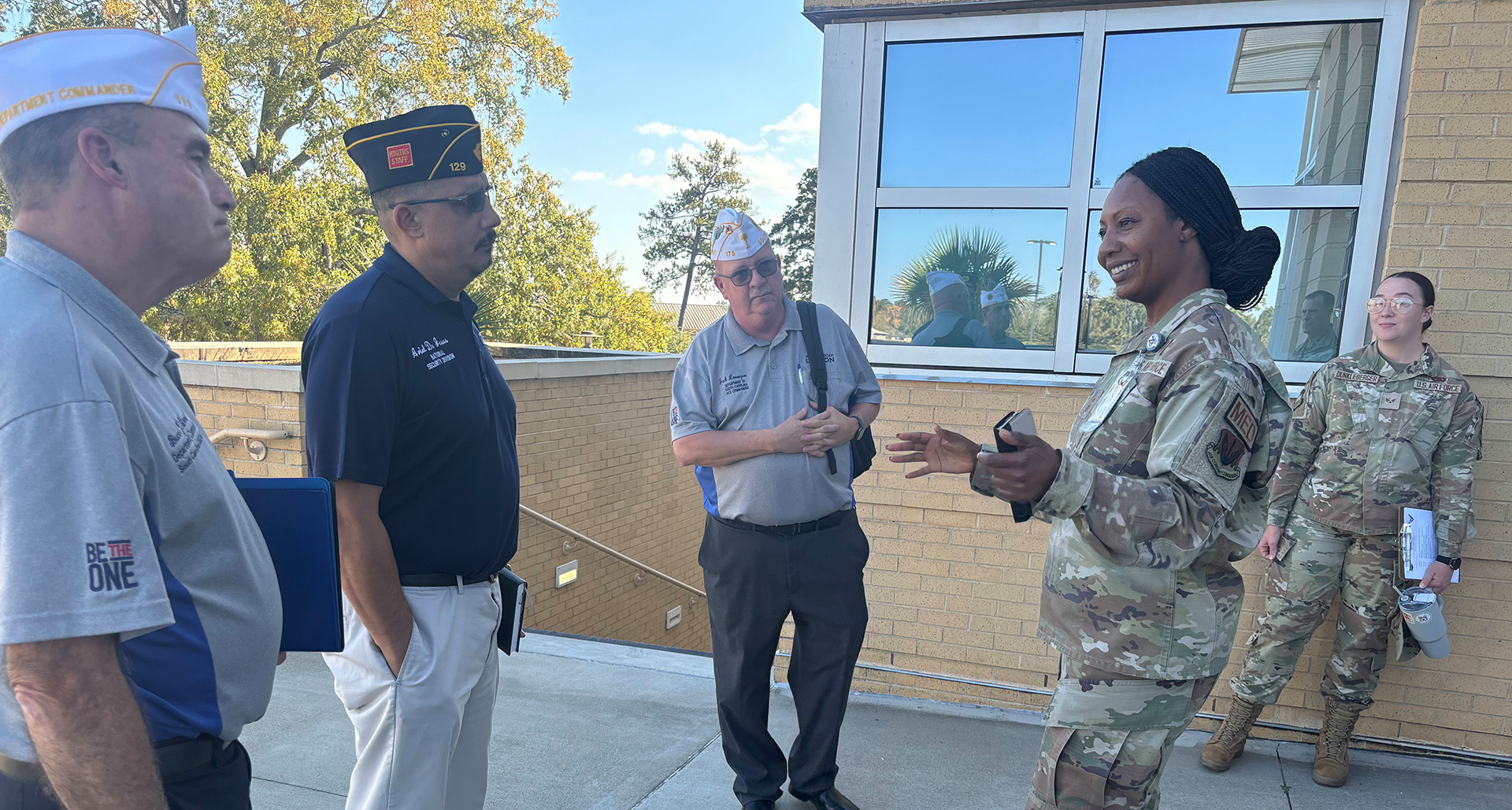
Visit addresses issues facing military members and their families.
Dining options, housing challenges and mental health services were among the top issues discussed between an American Legion delegation and officials at Shaw Air Force Base during a recent quality of life visit at the installation.
The Oct. 24 tour came more than a year after The American Legion instituted its Base Assessment and Servicemember Experience (BASE) program, which was established to address issues facing military members and their families by visiting various installations.
Located in Sumter, S.C., Shaw AFB is home of the 20th Fighter Wing, headquarters for the 9th Air Force and the Army component (ARCENT) of the U.S. Central Command. American Legion Department of South Carolina Commander Bruce Donnegan and South Carolina Vice Commander Jack Lonergan joined National Security staff members Alyson Stapleton and Ariel DeJesus during a command briefing and visits that included the base child development center, family housing facilities, dormitories, dental clinic, wellness center and 79th Fighter Generation Squadron.
As the command chief for the 20th Fighter Wing, one of Chief Master Sergeant Christopher Griste’s roles is to advise the commander there on issues involving the readiness, training, education and resiliency for the more than 7,100 active-duty airmen and 8,000 military family members at Shaw.
Budgetary battles in Washington, D.C., have an impact. “When folks on the hill don’t pass budgets on time, it makes it difficult for us to provide the quality of life that we would like,” he said. A procedure that has concerned commands throughout the military has been the reliance of continuing resolutions (CR), a practice that flat-lines budgets until an agreement is reached between Congress and the president.
“When we enter CRs, it greatly impacts our ability as an Air Force to move out on things such as modernization, readiness and quality of life improvements,” Griste said.
Though nutrition ranks high among requirements to maintain a physically fit fighting force, Shaw has been without an on-base dining facility (DFAC) since 2023. Until renovations of the DFAC are completed in 2026, Airmen will continue to receive monthly food allowances currently set at $920.50.
Issues that The American Legion should examine, according to Griste, are discrepancies between off-base housing allowances received by Shaw personnel and servicemembers stationed at Fort Jackson in Columbia. S.C. “I think I would most like you to discuss the BAH (basic allowance for housing) here at Shaw not matching the Columbia area, which is approximately $400 more,” he wrote in an email. “Because of not enough affordable/safe houses and the lack of quality schools, a large portion of our airmen live over an hour away in Columbia. The problem is that they do not earn the BAH for where they live but for where they are stationed. Ultimately this leads them to have to sometimes pay a considerable amount of money out of pocket.”
Donnegan praised base officials for their openness during The American Legion’s visit. “We all were able to see first-hand and ask questions about anything we wished to ask. The military leaders were open with us and were very helpful and cordial,” he said before adding that the Legion should call for increased funding in certain areas. “Today is an all-volunteer military and we are having problems recruiting able and experienced men and women to man our ships, fly our planes and use all the equipment we have today to have a more efficient military. We have to maintain our readiness but will not get the type of young people we need if living conditions and other issues and concerns are not taken care of.”
Stapleton characterized the Legion visit as “incredibly impactful to understanding the needs of our military.” It’s an understanding that The American Legion believes is best achieved through personal visits.
“These visits are important because we cannot simply rely on web stories or data extrapolated from surveys – we need to hear the servicemembers’ perspective firsthand. Surveys are marginal, and often silo participants into a strict set of questions,” she said. “Conversations open a two-way communication that spark ideas on reforms and shared best practices.”
Though the base has a child development center, there is a waiting list and community partners must be relied upon to fill the demand for safe and affordable daycare. “Shaw Air Force Base has numerous best practices that believe should be shared across the military departments,” Stapleton said. “For example, Military Child Care in Your Neighborhood was highly lauded by the individuals we spoke with. This is a commonsense solution to address the shortage in affordable childcare nationwide that should be continued.”
National Security staff are in the process of drafting a BASE report on its findings at Shaw AFB, which will be shared with members of Congress and the Department of Defense.
- Security

